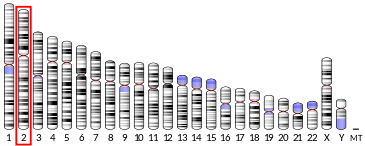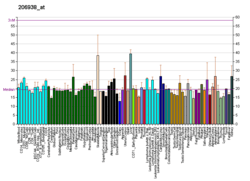SRD5A2
3-oxo-5α-steroid 4-dehydrogenase 2 is an enzyme that in humans is encoded by the SRD5A2 gene.[5][6] It is one of three forms of 5α-reductase.
Steroid 5α-reductase catalyzes the conversion of the male sex hormone testosterone into the more potent androgen, dihydrotestosterone.
This gene encodes a microsomal protein expressed at high levels in androgen-sensitive tissues such as the prostate. The encoded protein is active at acidic pH and is sensitive to the 4-azasteroid inhibitor finasteride. Deficiencies in this gene can result in male pseudohermaphroditism, specifically pseudovaginal perineoscrotal hypospadias (PPSH).[6]
See also
References
- 1 2 3 GRCh38: Ensembl release 89: ENSG00000277893 - Ensembl, May 2017
- 1 2 3 GRCm38: Ensembl release 89: ENSMUSG00000038541 - Ensembl, May 2017
- ↑ "Human PubMed Reference:".
- ↑ "Mouse PubMed Reference:".
- ↑ Thigpen AE, Davis DL, Milatovich A, Mendonca BB, Imperato-McGinley J, Griffin JE, Francke U, Wilson JD, Russell DW (Oct 1992). "Molecular genetics of steroid 5 alpha-reductase 2 deficiency". J Clin Invest. 90 (3): 799–809. doi:10.1172/JCI115954. PMC 329933. PMID 1522235.
- 1 2 "Entrez Gene: SRD5A2 steroid-5-alpha-reductase, alpha polypeptide 2 (3-oxo-5 alpha-steroid delta 4-dehydrogenase alpha 2)".
Further reading
- Thigpen AE, Davis DL, Gautier T, et al. (1992). "Brief report: the molecular basis of steroid 5 alpha-reductase deficiency in a large Dominican kindred". N. Engl. J. Med. 327 (17): 1216–9. doi:10.1056/NEJM199210223271706. PMID 1406794.
- Labrie F, Sugimoto Y, Luu-The V, et al. (1992). "Structure of human type II 5 alpha-reductase gene". Endocrinology. 131 (3): 1571–3. doi:10.1210/en.131.3.1571. PMID 1505484.
- Andersson S, Berman DM, Jenkins EP, Russell DW (1991). "Deletion of steroid 5 alpha-reductase 2 gene in male pseudohermaphroditism". Nature. 354 (6349): 159–61. doi:10.1038/354159a0. PMC 4451825. PMID 1944596.
- Boudon C, Lobaccaro JM, Lumbroso S, et al. (1995). "A new deletion of the 5 alpha-reductase type 2 gene in a Turkish family with 5 alpha-reductase deficiency". Clin. Endocrinol. 43 (2): 183–8. doi:10.1111/j.1365-2265.1995.tb01913.x. PMID 7554313.
- Thigpen AE, Silver RI, Guileyardo JM, et al. (1993). "Tissue distribution and ontogeny of steroid 5 alpha-reductase isozyme expression". J. Clin. Invest. 92 (2): 903–10. doi:10.1172/JCI116665. PMC 294929. PMID 7688765.
- Cai LQ, Zhu YS, Katz MD, et al. (1996). "5 alpha-reductase-2 gene mutations in the Dominican Republic". J. Clin. Endocrinol. Metab. 81 (5): 1730–5. doi:10.1210/jc.81.5.1730. PMID 8626825.
- Hochberg Z, Chayen R, Reiss N, et al. (1996). "Clinical, biochemical, and genetic findings in a large pedigree of male and female patients with 5 alpha-reductase 2 deficiency". J. Clin. Endocrinol. Metab. 81 (8): 2821–7. doi:10.1210/jc.81.8.2821. PMID 8768837.
- Vilchis F, Canto P, Chávez B, et al. (1997). "Molecular analysis of the 5 alpha-steroid reductase type 2 gene in a family with deficiency of the enzyme". Am. J. Med. Genet. 69 (1): 69–72. doi:10.1002/(SICI)1096-8628(19970303)69:1<69::AID-AJMG13>3.0.CO;2-M. PMID 9066886.
- Anwar R, Gilbey SG, New JP, Markham AF (1997). "Male pseudohermaphroditism resulting from a novel mutation in the human steroid 5 alpha-reductase type 2 gene (SRD5A2)". Mol. Pathol. 50 (1): 51–2. doi:10.1136/mp.50.1.51. PMC 379579. PMID 9208814.
- Can S, Zhu YS, Cai LQ, et al. (1998). "The identification of 5 alpha-reductase-2 and 17 beta-hydroxysteroid dehydrogenase-3 gene defects in male pseudohermaphrodites from a Turkish kindred". J. Clin. Endocrinol. Metab. 83 (2): 560–9. doi:10.1210/jc.83.2.560. PMID 9467575.
- Nordenskjöld A, Ivarsson SA (1998). "Molecular characterization of 5 alpha-reductase type 2 deficiency and fertility in a Swedish family". J. Clin. Endocrinol. Metab. 83 (9): 3236–8. doi:10.1210/jc.83.9.3236. PMID 9745434.
- Nordenskjöld A, Magnus O, Aagenaes O, Knudtzon J (1999). "Homozygous mutation (A228T) in the 5alpha-reductase type 2 gene in a boy with 5alpha-reductase deficiency: genotype-phenotype correlations". Am. J. Med. Genet. 80 (3): 269–72. doi:10.1002/(SICI)1096-8628(19981116)80:3<269::AID-AJMG18>3.0.CO;2-T. PMID 9843052.
- Nnane IP, Kato K, Liu Y, et al. (1999). "Inhibition of androgen synthesis in human testicular and prostatic microsomes and in male rats by novel steroidal compounds". Endocrinology. 140 (6): 2891–7. doi:10.1210/en.140.6.2891. PMID 10342882.
- Makridakis NM, Ross RK, Pike MC, et al. (1999). "Association of mis-sense substitution in SRD5A2 gene with prostate cancer in African-American and Hispanic men in Los Angeles, USA". Lancet. 354 (9183): 975–8. doi:10.1016/S0140-6736(98)11282-5. PMID 10501358.
- Vilchis F, Méndez JP, Canto P, et al. (2000). "Identification of missense mutations in the SRD5A2 gene from patients with steroid 5alpha-reductase 2 deficiency". Clin. Endocrinol. 52 (3): 383–7. doi:10.1046/j.1365-2265.2000.00941.x. PMID 10718838.
- Hellwinkel OJ, Müller A, Struve D, Hiort O (2000). "Influence of androgens and age on androgen receptor and 5 alpha-reductase II transcription". Eur. J. Endocrinol. 143 (2): 217–25. doi:10.1530/eje.0.1430217. PMID 10913941.
- Chávez B, Valdez E, Vilchis F (2000). "Uniparental disomy in steroid 5alpha-reductase 2 deficiency". J. Clin. Endocrinol. Metab. 85 (9): 3147–50. doi:10.1210/jc.85.9.3147. PMID 10999800.
- Kim KS, Liu W, Cunha GR, et al. (2002). "Expression of the androgen receptor and 5 alpha-reductase type 2 in the developing human fetal penis and urethra". Cell Tissue Res. 307 (2): 145–53. doi:10.1007/s004410100464. PMID 11845321.
- Hiort O, Schütt SM, Bals-Pratsch M, et al. (2002). "A novel homozygous disruptive mutation in the SRD5A2-gene in a partially virilized patient with 5alpha-reductase deficiency". Int. J. Androl. 25 (1): 55–8. doi:10.1046/j.1365-2605.2002.00325.x. PMID 11869378.
This article incorporates text from the United States National Library of Medicine, which is in the public domain.
This article is issued from
Wikipedia.
The text is licensed under Creative Commons - Attribution - Sharealike.
Additional terms may apply for the media files.




